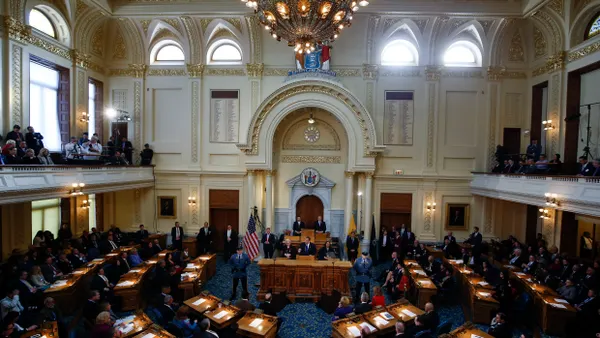With companies scrambling to raise money, convertible bonds have ballooned in popularity. Some $21 billion in the bonds were issued in May, according to Dealogic data, the highest monthly total on record.
Companies see the hybrid securities, which offer a regular payout but can be traded for equity shares once a certain price point is hit, as a way to get cash without having to sell shares at lower valuations.
Convertible bonds are best for emerging small- to mid-cap tech companies that use the funds to finance new products or services at lower interest rates than they would pay for high-yield debt, experts say.
Convertibles are also attractive to these companies because if they turn into equity, they command a 30 to 35% higher per-share proceeds than if the firm had a straight stock issue, said Joe Wysocki, senior vice president of Calamos Investments. Calamos claims to have pioneered the asset class over 40 years ago.

He pointed out small to mid-size emerging tech companies issuing convertibles typically can't get loans directly from banks and don't have hard assets.
Mature large cap companies, on the other hand, eschew convertibles because they can get low interest loans directly on the corporate debt market, Wysocki said. In early June, Apple paid just 0.4% for a billion in notes.
Option for tough times
But some mature companies in hot water find convertibles attractive as well. In April, cruise line operator Carnival Corporation was able to price $1.75 billion in convertible notes at half of the interest rate it obtained for $4 billion in regulator corporate bonds (5.75% compared to 11.5%).
Investors who bought $1.6 billion in Uber convertibles in 2015 were expected to reap a 40% discount on the company's stock when it went public four years later, CNBC reported.
Convertibles are a fourth way of raising capital, a stepsister to straight debt (high yield bonds), bank debt and equity.
For small to mid-cap companies that issue convertibles, they are usually the only debt they have on their books.
The typical maturity is five years and usually callable with five year puts and calls.
Tech firms issue convertibles from early stages to venture capital time to post-IPO, Wysocki notes.
The U.S. public market currently has $250 billion in convertibles. Individual offerings can range up to $1 billion. Businesses that can’t pay off convertibles need to refinance, but Wysocki asserts defaults are rare.
Impact to shareholder value
CFOs like convertibles because they're simple and quick to get to market, Wysocki said. Usually, an issue doesn't require a rating from a credit rating agency; private placements can be done off an existing shelf registration, and, start to finish, an issue can take two days, compared to weeks for high yield debt.
The heightened uncertainty facing companies and investors over the last several months as a result of the coronavirus pandemic has led to a doubling of convertibles outstanding, compared to the same time last year.
"Given the current volatile market environment and downward pressure on stock prices, it's no surprise investor sentiment has turned negative around companies issuing equities to raise capital, primarily because of the dilutive effect on their stock holdings," Heather Hall, CFO of fixed income tech company 280 CapMarkets, said.
When convertibles are changed into equity, they can impact shareholder value negatively, and have adverse effects on a company's earnings metrics and projections, she said.
Companies in competitive industries might want to consider the potential future dilutive effects on their share price, and corresponding negative implications to their overall market share and earnings per share metrics, Hall said, noting the dilutive effects to shareholder value that will be much larger, proportionally, in a smaller company.
“The phenomenon of an activist investor who could potentially acquire the majority of the convertible debt and 'run away' with the company should be contemplated," Hall warned.
Hall says a bad time to issue convertible bonds is when sizable issuances of any convertible securities are outstanding, as the dilutive effects could be enormous.











